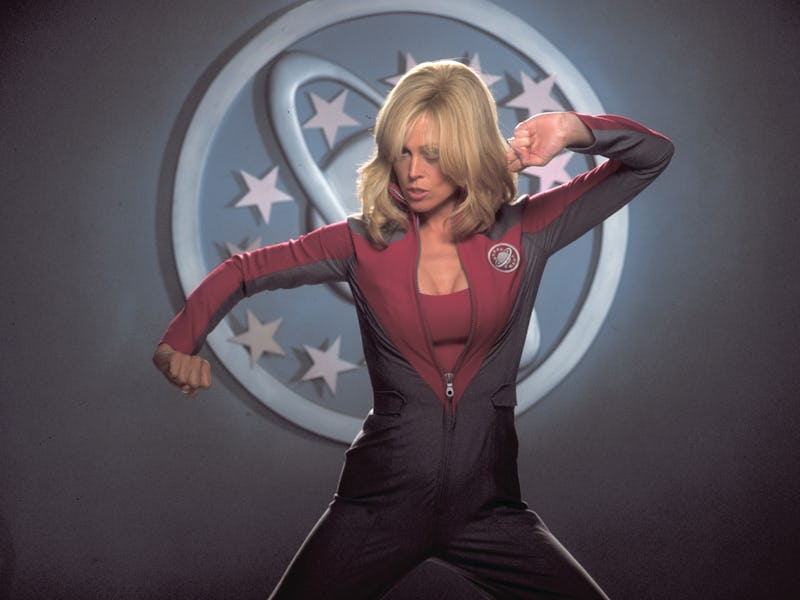Galaxy Quest No Longer Needs Star Trek
Never Surrender.

If you’ve never seen Star Trek, do you truly understand science fiction fan culture? Today, thanks to the fact that the first two decades of 21st-century geek culture were mostly fueled by fandoms that were not Star Trek, the answer to this question is obviously yes. From the explosion of the MCU to the Doctor Who renaissance that began in 2005, to the end and rebirth of Star Wars, there’s been a lot of geekery to go around. But arguably, in the mid-1990s, Star Trek was king. Back then, inside jokes about fandom or geek culture would naturally connect to the final frontier.
But the funny thing is, 25 years later, the greatest Star Trek parody of all can be watched without any knowledge of Trek at all.
Unlike The Orville, which is visually coded to look like Trek, what makes Galaxy Quest utterly unique among sci-fi comedies is its metafictional aspect. While some novels have bridged fandom and metafictional geeky worlds (like Bob Proehl’s A Hundred Thousand Worlds, or Alex Segura's recent book Alter Ego), the number of genre films that successfully blend an un-inverse science fiction franchise with actual science fiction are quite rare. So viewed through this very specific subgenre lens, Galaxy Quest is like an earlier version of Black Mirror’s “USS Callister,” but instead of dark and depressing, it’s uplifting and wonderful.
Focused on a group of washed-up actors, who are all best known for their work on a canceled sci-fi show called Galaxy Quest, the movie hits the ground running with exactly everything you need to know. We start with a faux-’80s clip from an episode of “Galaxy Quest,” which ends on a cliffhanger. We then cut to where the stars are today, in the late 1990s, making a buck by doing modest-sized conventions, all together.
The crew of the Protector try to do their best to fake it.
Much has been written about how Tim Allen’s character Jason Nesmith both does and doesn’t represent William Shatner. Even William Shatner infamously said, “For the life of me I was trying to understand who he was imitating.”
With all respect due to Mr. Shatner, this is one of the things about Galaxy Quest that is so great. You don’t have to read Nesmith as an analog to Shatner on Star Trek at all. Instead, Tim Allen’s performance captures several archetypes of leading men on TV shows simultaneously, but also, is very much its own thing. Ditto Tony Shalhoub’s Fred Kwan. A close analysis of the character reveals that he’s supposed to be a massive stoner. Was this a reference to some very specific sci-fi actor, other than say, Harrison Ford in Star Wars?
Perhaps the best proof that Galaxy Quest doesn’t need to be read as a Star Trek parody to be fully enjoyed comes from the mere presence of Sigourney Weaver as Gwen DiMarco. Already lauded for her roles in various science fiction films like Alien and Aliens, Weaver did not need to do a comedy that mocked science fiction. Arguably, she was already in one of the most famous sci-fi comedies of all time, Ghostbusters. But what Weaver does with the role of Gwen is something she’d never done before: She’s playing a beloved sci-fi actress, something she knows quite a lot about indeed.
Galaxy Quest kind of looks like Star Trek, but the movie is great — even if you’ve never seen one episode of that franchise.
In a way, Galaxy Quest almost wouldn't work at all without the wink-wink presence of Sigourney Weaver. Her character, Lieutenant Tawny Madison, famously repeated the ship’s computer on the fictional show, and one of the funniest moments in the movie is when she defends her right to repeat the computer in real life. “Look, I have one job on this lousy ship! It’s stupid but I’m gonna do it, okay?”
This hilarious scene is a perfect microcosm for the enduring excellence of Galaxy Quest. Weaver’s line delivery is super realistic, but the subject matter is a bit deeper. Galaxy Quest’s biggest theme was to wonder whether or not absurd science fiction, which was objectively cheesy, could still be deep and meaningful. What that scene proves — and what the movie proves by extension — is that pop art doesn't have to make sense, or even be particularly well made to matter. Galaxy Quest didn’t need you to understand all of its references to make you laugh, and it didn’t even need to be considered “real” science fiction to be one of the best sci-fi movies of all time.